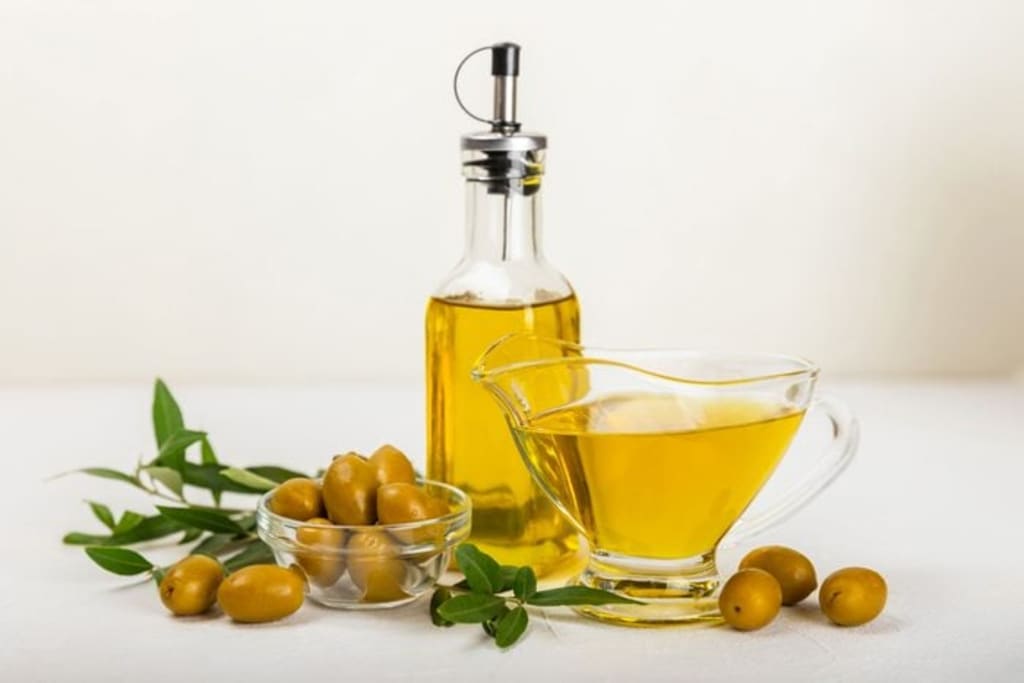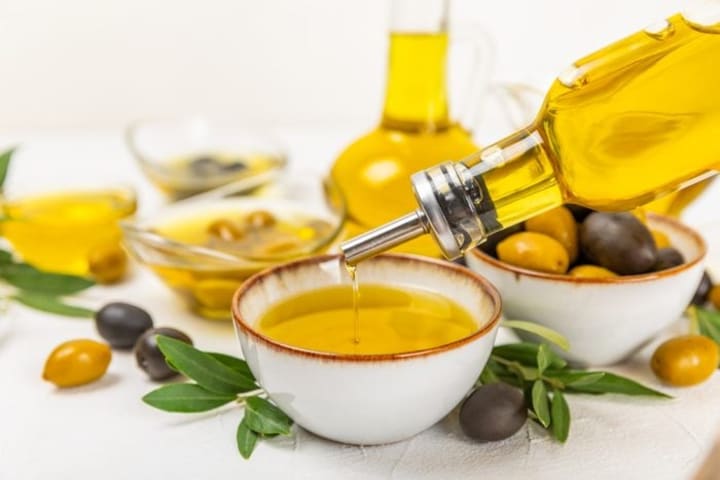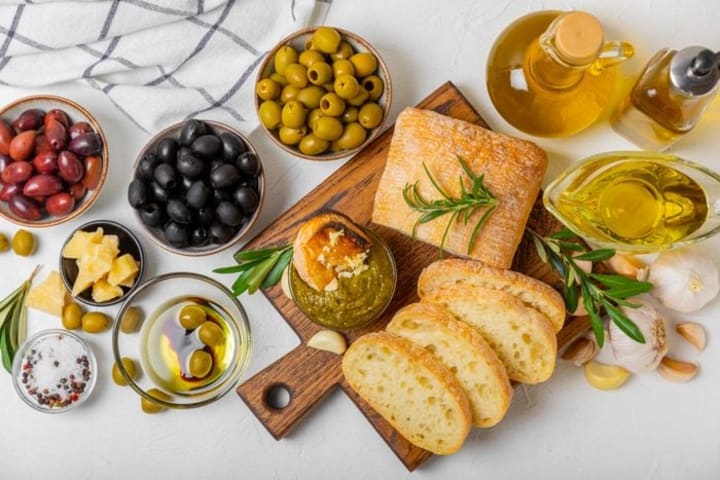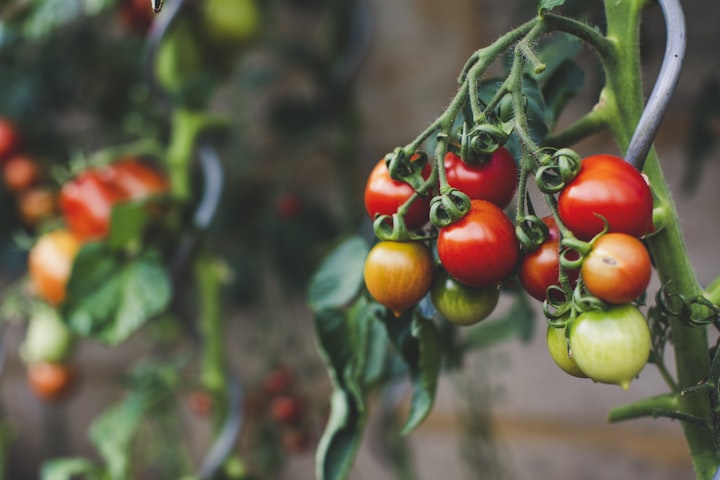When compared to olive oil, what is the difference between extra virgin olive oil and olive oil?
Should you use olive oil or extra virgin olive oil in a certain situation?

We are going to discuss the numerous applications in cooking as well as the variances in flavour.
When you go to the grocery store, it might be difficult to look at all of the different olive oil alternatives. Olive oil, in contrast to vegetable oil or canola oil, seems to be available in a considerable number of brands. In addition, there are a number of other varieties, including cold-pressed, virgin, extra virgin, refined, and extremely light.
Should you go with one of these options?
It is said that this golden oil may help avoid a wide range of serious ailments and is associated with a number of health advantages; however, a significant portion of these benefits can be attributed to the quality of olive oil that you purchase. Let's go over the fundamentals of olive oil vs extra virgin olive oil, and find out when it is more advantageous to use one kind of olive oil rather than the other.
Olive oil is what exactly?
Crushing the mature fruit of the olive tree is the process that results in the production of olive oil. Olive trees, in their current form, have been there for thousands of years, and historians think that people have been producing olive oil and ingesting it for more than 6,000 years. There is evidence in the form of fossils that suggests cousins of the olive tree existed for millions of years ago. It is believed that the olive tree originated in Asia Minor, but it subsequently expanded over the greater Mediterranean basin. The majority of the olive oil that is produced worldwide is still produced in those places.
When it is at normal temperature, the oil is liquid, but when it is cold, it becomes solid. In addition to being an essential component of the very nutritious Mediterranean diet, olive oil is also one of the principal cooking fats in a number of countries, including Greece, Spain, and Italy, amongst others.
Standard olive oil, which cannot be classified as "virgin" or "extra virgin," is more refined than virgin olive oil, which means it has less flavour. Additionally, regular olive oil may have been heated during the manufacturing process. It is regarded as a kind of olive oil that is of a poorer quality. There is a possibility that it might be produced using olives that have flavour flaws; however, due to the fact that it is refined, such flavour notes will not be visible in the final product.
Could you describe the flavour of olive oil?

Regular olive oil will contain some of the qualities of the olives from which it was created; nevertheless, due to the process by which the oil is generated, the flavour of regular olive oil will typically be quite smooth and mild. The chemicals that are responsible for the distinctive and intriguing flavours of olive oil are eliminated during the process of heating and refining the oil.
How should olive oil be utilised?
As an oil for cooking, non-virgin olive oil might be an excellent choice. Not only can it be used to sauté vegetables, but it may also be used to marinate meats (although virgin oils are also excellent for these kinds of chores).
The smoke point of olive oil is lower than that of peanut oil, canola oil, maize oil, and other oils that are favoured for use in very hot applications. As a result, there is some disagreement about whether or not olive oil should ever be used for frying. When compared to olive oil that has not been refined, refined olive oil will almost certainly have a greater smoke point. Furthermore, refined olive oil will definitely have a higher smoke point than unfiltered olive oil. For the purpose of clearing up any misunderstandings, we have compiled a reference on cooking oils that covers a wide range of applications and uses.
What exactly is meant by the term "extra virgin olive oil"?
Extra virgin olive oil is a kind of olive oil that has been created via cold mechanical extraction, such as by grinding with stones, and without the use of any chemicals. This is in contrast to olive oils that have been treated with a chemical treatment, which are of a considerably lesser quality.
An additional requirement for the oil to be considered extra virgin is that it must have a low proportion of free oleic acid and obtain excellent grades for its flavour. Extra virgin olive oil that has been cold-pressed keeps a much higher concentration of the nutrients that are considered as being beneficial to one's health. The term "virgin oil" may be used to refer to oil that has been cold-pressed but does not meet the criteria for the extra virgin classification.
How would you describe the flavour of extra virgin olive oil?
Extra virgin olive oil is a grade of olive oil that is kept for the batches that are considered to be the most delectable. It is produced from the same kinds of olives as ordinary olive oil. Virgin oils will have a distinct flavour that is determined by the kind or types of olives that were used in the pressing process, as well as the degree of ripeness of the olives at the time of harvest.
There are certain virgin olive oils that have a buttery and smooth flavour, but the majority of them have a peppery and grassy flavour, and they will sometimes create a little irritation in the back of the throat. On the packaging of some olive oil, there is information regarding the flavour profile of the oil that is contained therein.
In what ways might extra virgin olive oil be utilised?

Extra virgin oil tastes great when drizzled over salads or dipped in bread. Extra virgin oil is more costly than virgin oil, so budget-conscious chefs may store it for special occasions. If you have funds or are budgeting for healthier items, extra virgin olive oil may be used for low-to-medium heat cooking.
One of the healthiest fats is extra virgin olive oil. Olive oil is not versatile due to its strong flavour. If you want olive oil's health advantages without the zing, mix it with neutral or nutty oils like sunflower or grape seed.
Mediterranean recipes like hummus, pesto, and gazpacho benefit from olive oil alone. Choose olive oil for pasta, pizza dough, and bread dips because its rich, pungent flavour complements starchy meals. This is also a key tabbouleh dressing ingredient.
If desired, extra virgin oil may replace olive oil in sauces and cooking.
Olive Oil vs. Extra Virgin
Regular olive oil is refined and heat-produced. Virgin and extra virgin oils taste identical, but extra virgin offers the best flavour.
Consider using a cheaper oil for pan frying and sauces, but have a bottle of extra virgin olive oil on hand for salad dressings, soups, bread dips, and more. Use virgin olive oil for cooking and the best for special events.
Choose extra virgin if money is no issue and you just want one bottle of oil on the shelf. Like other olive oils, it may be used in the same ways but tastes better. Additionally, extra virgin oil is said to be the healthiest.
Remember that some olive oils are buttery and balanced, while others are grassy or spicy. The flavour of olive oil you prefer may be more essential than its virginity!
Whatever you pick, keep olive oil correctly.
About the Creator
Jacob Damian
Whether you're looking to learn something new, explore different perspectives, or simply satisfy your curiosity, I can offer you insights and perspectives that you may not have considered before. With my ability to process and analyse.






Comments
There are no comments for this story
Be the first to respond and start the conversation.